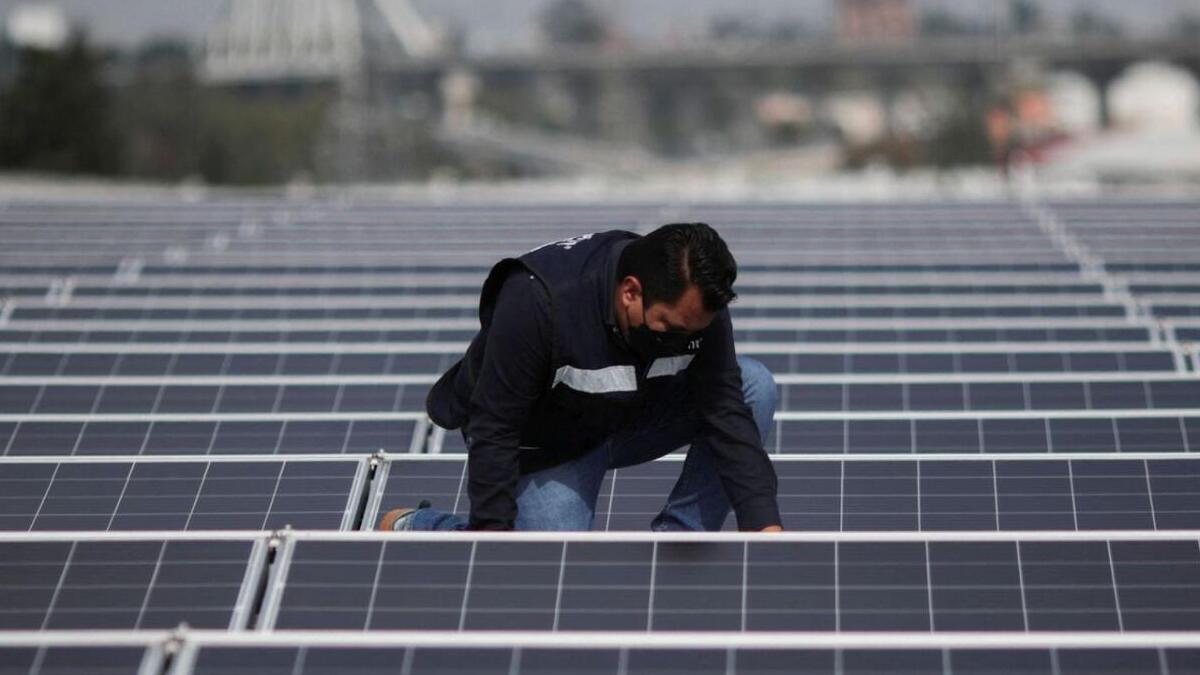Solar investment surpasses oil, according to the IEA.
According to the International Energy Agency (IEA), global investments in clean energy technologies are expected to exceed $1.7 trillion in 2023, with solar energy poised to outshine oil production spending for the first time. In its World Energy Investment Report, the IEA forecasts that solar investments will attract over $1 billion per day in 2023.
Fatih Birol, the executive director of the IEA, announced that solar investment is set to overtake the amount of funding allocated to oil production. He highlighted that current investment in fossil fuels is more than double the levels required in the Net Zero Emissions by 2050 Scenario. Birol emphasized the increasing shift towards clean energy, stating that “clean technologies are pulling away from fossil fuels.” He noted that for every dollar invested in fossil fuels, approximately $1.7 is now being directed towards clean energy, compared to a ratio of one-to-one five years ago.
The World Energy Investment Report projects that around $2.8 trillion will be invested globally in energy in 2023. Out of this total, $1.7 trillion is expected to be allocated to clean technologies, including renewables, electric vehicles, nuclear power, grids, storage, low-emissions fuels, efficiency improvements, and heat pumps. The remaining funds, slightly over $1 trillion, will be directed towards coal, gas, and oil.
Birol further stated, “Clean energy is moving fast – faster than many people realize.” He emphasized the rising investment trends in clean technologies, with solar energy leading the way and poised to surpass oil production investment for the first time.
According to Haitham Al Ghais, the Secretary-General of OPEC, the global oil sector will require a cumulative investment of $12.1 trillion until 2045, equating to around $500 billion annually. Al Ghais mentioned during the Annual Middle East Petroleum & Gas Conference that oil is expected to maintain the largest share in the energy mix, accounting for nearly 30% by the year 2045.
The IEA report highlights that low-emissions electricity technologies, led by solar energy, are expected to account for nearly 90% of investment in power generation. Consumers are also increasing their investments in electrified end-uses, with global heat pump sales experiencing double-digit annual growth since 2021. Electric vehicle sales are projected to surge by one-third this year, following a significant increase in 2022.
The IEA report highlights that low-emissions electricity technologies, led by solar energy, are expected to account for nearly 90% of investment in power generation. Consumers are also increasing their investments in electrified end-uses, with global heat pump sales experiencing double-digit annual growth since 2021. Electric vehicle sales are projected to surge by one-third this year, following a significant increase in 2022.
Several factors have contributed to the boost in clean energy investments in recent years. These include periods of robust economic growth, volatile fossil fuel prices raising concerns about energy security, and geopolitical events such as Russia’s invasion of Ukraine. Additionally, enhanced policy support through major actions like the US Inflation Reduction Act and initiatives in Europe, Japan, China, and other regions have played a significant role in driving clean energy investments.
The transition towards clean energy is gaining momentum globally as countries and businesses recognize the urgency to mitigate climate change and reduce carbon emissions. Solar energy, in particular, has emerged as a frontrunner in the clean energy revolution due to its abundant availability, falling costs, and technological advancements.
The IEA’s forecast underscores the shifting landscape of the energy sector, with solar investment surpassing traditional oil production spending. This significant milestone reflects the growing confidence in renewable energy sources and the increasing realization that clean technologies offer a sustainable and economically viable path forward.
Several factors have contributed to the boost in clean energy investments in recent years. These include periods of robust economic growth, volatile fossil fuel prices raising concerns about energy security, and geopolitical events such as Russia’s invasion of Ukraine. Additionally, enhanced policy support through major actions like the US Inflation Reduction Act and initiatives in Europe, Japan, China, and other regions have played a significant role in driving clean energy investments.






Yvofjy
buy ivermectin for humans – order generic atacand 8mg carbamazepine 200mg generic
January 3, 2025Htycqh
buy isotretinoin 10mg generic – buy dexamethasone online zyvox for sale online
January 18, 2025Jwzjlh
amoxicillin ca – buy diovan 80mg order combivent 100 mcg generic
January 19, 2025Aarfmb
order azithromycin 250mg – buy azithromycin generic order bystolic without prescription
February 1, 2025Ktwkcw
omnacortil 10mg without prescription – buy progesterone 100mg generic order generic progesterone 200mg
February 3, 2025Pnaadd
order neurontin sale – order clomipramine 50mg generic itraconazole 100 mg generic
February 10, 2025Bishcj
furosemide without prescription – lasix pills buy betamethasone 20gm
February 10, 2025Zwxugp
buy clavulanate online – buy augmentin 1000mg online cheap oral duloxetine
February 15, 2025Iuywix
cheap vibra-tabs – brand glipizide 10mg buy glucotrol 10mg for sale
February 17, 2025Smtzlt
purchase amoxiclav pills – where can i buy duloxetine buy cymbalta generic
February 23, 2025Xdguqj
rybelsus over the counter – cost semaglutide 14 mg cyproheptadine 4mg usa
February 25, 2025Nqqhss
buy tizanidine 2mg pills – where can i buy hydroxychloroquine microzide 25 mg cost
February 28, 2025Rthynl
tadalafil medication – cost of cialis viagra mail order us
March 6, 2025Mwdiyp
viagra pharmacy – purchase sildenafil for sale tadalafil drug
March 8, 2025Slydxl
atorvastatin 80mg sale – lipitor 20mg oral order zestril 10mg pill
March 15, 2025Lqzuxk
buy cenforce pills – order cenforce 100mg purchase glucophage generic
March 16, 2025Uqjmnw
lipitor 20mg oral – atorvastatin 80mg oral brand prinivil
March 17, 2025Yyjvbw
oral omeprazole – buy atenolol generic atenolol 100mg for sale
March 21, 2025Rgnycg
medrol 8 mg without prescription – aristocort drug buy generic triamcinolone 4mg
March 27, 2025Urnkmx
desloratadine 5mg pill – desloratadine online order order priligy 30mg generic
March 29, 2025Taybqv
purchase cytotec online cheap – buy generic cytotec purchase diltiazem online cheap
March 31, 2025Hfkikk
acyclovir ca – order zyloprim 100mg online brand rosuvastatin 10mg
April 6, 2025Jnncse
order domperidone – domperidone cost buy cyclobenzaprine tablets
April 8, 2025Zxtsjy
buy motilium pills – order domperidone online cost flexeril
April 16, 2025Oekhdt
inderal 20mg uk – inderal 20mg price order methotrexate 10mg
April 17, 2025Nxqycw
buy coumadin pills for sale – buy metoclopramide no prescription hyzaar price
April 20, 2025Ebrtmy
order levaquin sale – buy avodart 0.5mg for sale ranitidine 150mg brand
April 24, 2025Jqhhnn
buy esomeprazole online cheap – esomeprazole 20mg pills sumatriptan 50mg generic
April 24, 2025Iiszso
meloxicam cost – meloxicam price tamsulosin 0.2mg for sale
April 30, 2025